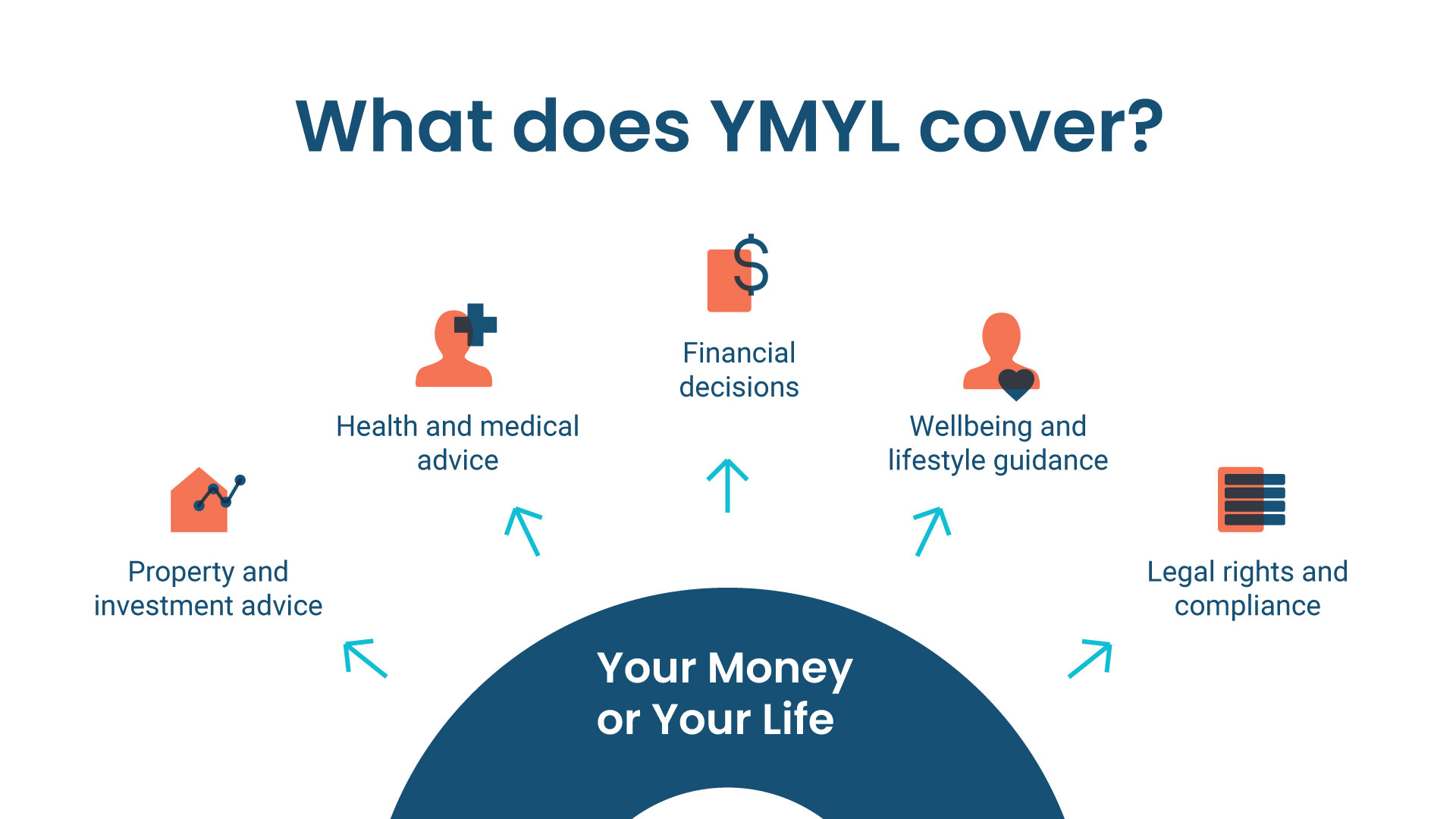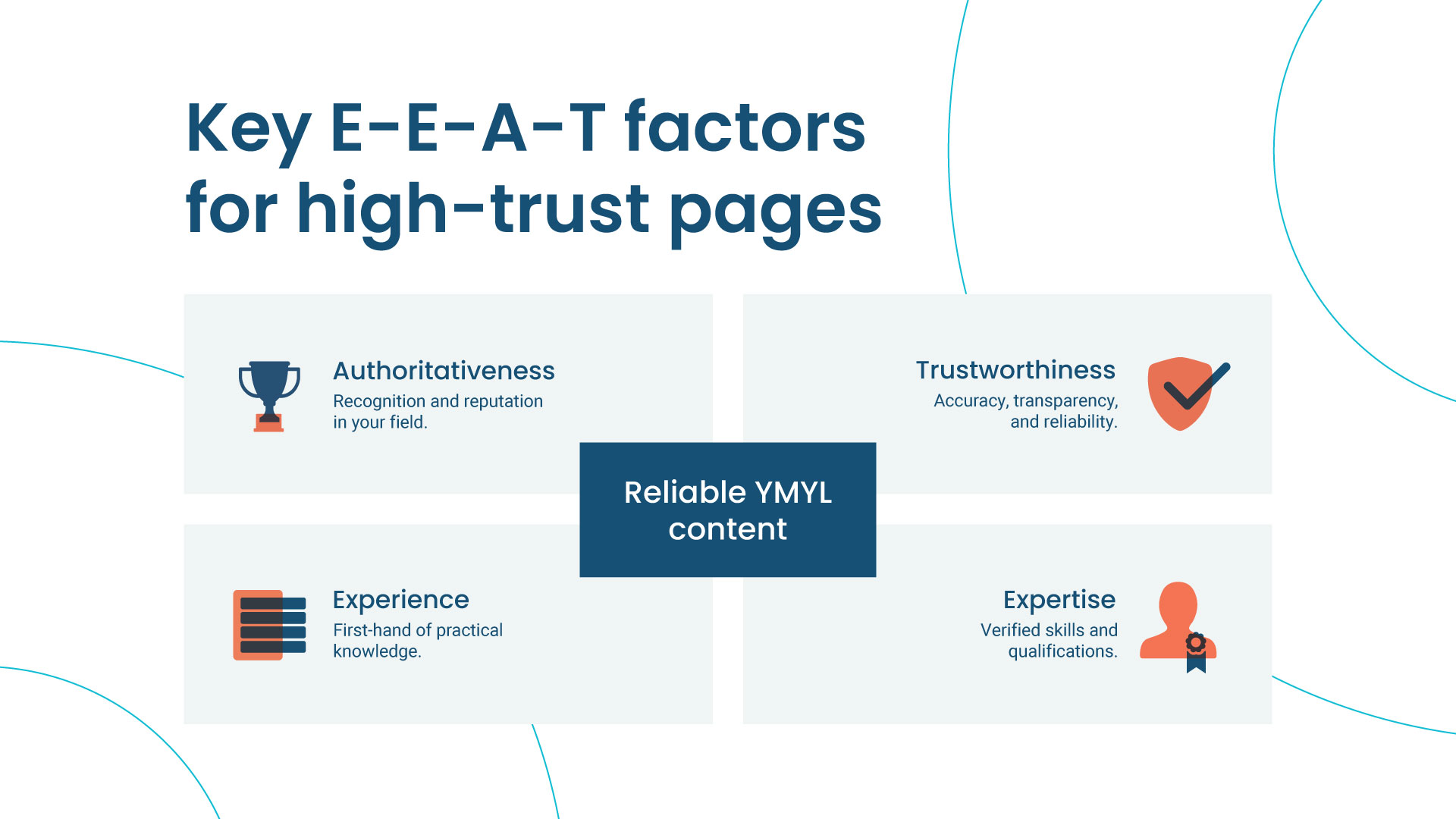If your business operates in finance, health, or legal services, your website falls under what Google classifies as YMYL content, short for Your Money or Your Life. This covers any topic that could impact a person’s finances, health, mental wellbeing, or safety.
Google treats this type of content differently because of how much influence it can have on someone’s daily life. Advice about managing money, making medical decisions, or interpreting legal issues carries serious responsibility. Inaccurate or misleading information in these areas can lead to real-world harm, which is why Google places extra emphasis on accuracy, credibility, and transparency.
This approach ties directly into E-E-A-T, which stands for Experience, Expertise, Authoritativeness, and Trustworthiness. It is Google’s framework for assessing how reliable your content is and how much it deserves to rank. Understanding both concepts is essential for building trust with Google and, more importantly, with your audience.
What is YMYL content?
“Your Money or Your Life” refers to content that can directly affect someone’s quality of life. This includes information or advice that influences their finances, health, safety, or overall wellbeing.
Because this kind of content has real-world implications, Google applies stricter standards when evaluating it. The goal is to protect users from misinformation that could lead to financial loss, poor health decisions, or legal risk.
Common categories include:
- Financial advice such as investment tips, tax guidance, or budgeting strategies.
- Health and medical information, including treatment advice, mental health discussions, or physical rehabilitation.
- Legal guidance about contracts, rights, or compliance obligations.
- Safety and security topics, such as travel, home safety, or emergency preparation.
Even businesses outside traditional medical or financial sectors can be affected if their advice influences a reader’s choices or wellbeing.
Why it matters for SEO
Content that falls within these higher-trust categories plays a major role in how Google evaluates your site’s credibility and rankings. Because the information can shape real-world decisions, it’s held to a higher standard of accuracy and expertise than general topics.
When these pages fail to meet expectations, they can lose visibility quickly. Google’s quality raters and algorithms look for evidence that the content is written or reviewed by people with the right knowledge or qualifications. If that’s missing, even well-written pages can struggle to perform. You can see this reflected in updates like Google’s Helpful Content Update, which prioritises original, user-focused content written by genuine experts.
E-E-A-T principles are central to this evaluation. They show that your content is backed by experience, verified knowledge, and a reputation for trust. For businesses in regulated industries, this is not only about SEO performance. Meeting these standards also protects brand reputation and builds genuine user confidence, which directly impacts conversions and long-term growth.
Key E-E-A-T factors for high-trust pages
When it comes to ranking this type of content, Google looks closely at how well your pages demonstrate Experience, Expertise, Authoritativeness, and Trustworthiness. Each element plays a different role, but together they determine how reliable your site appears.
Experience
Google values content created by people with first-hand or practical experience. For example, a physiotherapist explaining recovery exercises or a financial adviser breaking down tax deductions adds real-world credibility. When the author has genuine experience, the content feels authentic and useful, which are two qualities Google aims to prioritise.
Expertise
This goes beyond experience. It focuses on whether the author or reviewer has the right qualifications or credentials to discuss the topic. It’s especially important in regulated sectors such as health, law, and finance, where misinformation can cause harm. Including verified author bios, professional titles, and evidence-based references helps show Google that your content is backed by credible knowledge.
Authoritativeness
Authority is built over time through recognition and reputation. This might come from backlinks, mentions, awards, or partnerships within your industry. When others consistently reference or trust your content, it signals to Google that your site is a reliable source of information.
Trustworthiness
Trust is the foundation of every YMYL page. It’s shown through transparent sources, clear contact information, secure site protocols (HTTPS), and regularly updated, accurate content. Publishing review policies, disclaimers, and privacy statements can also help users feel confident in the information you provide.
When all four elements work together, they send strong signals to Google that your content deserves to rank and that users can rely on it.
Which websites are most affected?
Not every website falls under YMYL, but those that publish information capable of influencing financial, health, legal, or personal decisions are most affected. These sites face higher scrutiny from Google’s algorithms and quality raters, meaning they must maintain stronger accuracy, author credentials, and trust signals to perform well in search results.
Below are some of the main industries where these principles apply most directly.
| Industry | Examples of YMYL Content | Primary SEO Focus |
| Health & Medical | Treatment information, condition pages, patient education | AHPRA compliance, practitioner credentials, peer-reviewed and evidence-based content |
| Finance & Investment | Tax advice, superannuation, loans, business finance | Regulatory accuracy, transparent data, current legislation |
| Legal & Compliance | Rights information, contracts, dispute resolution | Qualified authors, factual precision, clear disclaimers |
| Property & Real Estate | Buying guides, home loans, investment advice | Verified data, lending or regulatory compliance, trust signals |
| Wellbeing & Lifestyle | Nutrition, physiotherapy, mental health, fitness | Scientific evidence, professional endorsement, user-centred advice |
| Safety & Technical Services | Workplace safety, electrical or engineering guidance | Certified expertise, standards compliance, risk-based accuracy |
For businesses in these fields, demonstrating author credentials, professional certification, or regulatory compliance (such as AHPRA in health or ASIC in finance) can be just as important as traditional SEO factors. It helps Google verify that the information is both legitimate and safe for users to follow.
Common SEO mistakes for YMYL pages
Even experienced site owners can overlook the details that matter most with YMYL content. Often, the difference between a page that ranks and one that doesn’t comes down to how credible the author appears, how current the information is, and how much users can trust what they are reading.
Here are some of the most common issues:
1. Missing author information or credentials
Anonymous or generic content will struggle to earn trust. Every article should clearly show who wrote it, their role, and, where relevant, their qualifications or experience.
2. Outdated or incomplete information
YMYL content must be accurate and up to date. Old statistics, expired regulations, or vague medical claims quickly erode user trust and signal poor quality to Google.
3. Generic writing with no real insight
Pages that simply restate information found elsewhere provide little value. Google looks for first-hand experience, real expertise, and unique perspectives that help users make informed decisions.
4. No disclaimers or expert review
If your site publishes financial or health advice, disclaimers and “reviewed by” notes are essential. They show transparency and accountability for the information being shared.
5. Weak trust signals
Missing contact details, privacy policies, or HTTPS certificates can make a site look unreliable. Users need to see who is behind the content and how to reach them.
6. Ignoring user intent
Writing content that targets keywords instead of answering real questions often leads to poor engagement. Understanding what users actually want helps shape content that feels helpful and relevant.
7. Poor site usability
A confusing layout, slow load times, or intrusive pop-ups all reduce trust. A fast, mobile-friendly site with clear navigation shows users (and Google) that you care about their experience.
8. No structured data or schema markup
Schema markup for authors, reviews, or articles helps Google confirm your site’s expertise and authenticity. Without it, you miss an easy opportunity to strengthen E-E-A-T signals.
Fixing these issues not only improves visibility but also reinforces long-term credibility. YMYL performance depends on how trustworthy your site feels to both people and search engines.
Actionable optimisation tips
Improving performance in high-trust categories starts with one goal: make your content credible, compliant, and grounded in real experience. The following steps align with that outcome and reflect what Google values most in YMYL content.
Build visible credibility
Make it clear who wrote the content, why they are qualified, and where the information comes from. Use detailed author bios, professional profiles, and credible references to demonstrate authority.
Maintain structure and compliance
Review your content regularly to ensure accuracy and alignment with professional or regulatory standards. Add disclaimers where appropriate and update information as legislation or best practices change.
Show real-world experience
Google prioritises content created or reviewed by people with first-hand expertise. Include practitioner insights, genuine examples, and experience-based recommendations that add depth beyond surface-level information.
Strengthen user confidence
Fast load times, secure connections, and clear navigation all improve user trust. Combine these with visible contact details, privacy policies, and reviews to make your site feel transparent and accountable.
Practical examples
Digital Hitmen has implemented these principles across multiple client projects:
- E Eye Place – We enhanced E-E-A-T by creating a detailed team page showcasing each optometrist’s qualifications, experience, and affiliations. Combined with local keyword optimisation and structured on-page SEO, this improved visibility for services like aviation eye exams and myopia treatment while strengthening trust through verified expertise. The result?
- 80% (5.8k) increase in Organic sessions
- 55% increase in online leads
- 39% (11.6k) increase in Page views
- Physio & Exercise Lab – We developed E-E-A-T-focused page templates that highlighted practitioner credentials, transparent pricing, and client FAQs. A hub-and-spoke content model connected targeted blog posts (such as vestibular physio exercises) to optimised landing pages, improving both search visibility and conversion. Technical SEO enhancements, natural link acquisition, and Google Business Profile optimisation lifted site speed, domain authority, and lead volume. These are the numbers:
- Organic rankings: top-3 positions rose from 9 to 133; tracked keywords grew from 443 to 6,560
- Sessions: monthly organic sessions climbed from 1,019 to 7 340 (+620 %)
- Patient bookings: grew from 188 to 283 (+51 %)
- ROI: delivered a 309% return on investment.
- Local authority: referring domains increased from 28 to 48; GBP clicks up 31% (153→201); impressions up 59% (596→949)
When credibility, compliance, and user experience align, your site becomes both trustworthy and competitive — the foundation for strong YMYL performance.
Why YMYL compliance builds lasting SEO success
YMYL principles aren’t just another SEO guideline. They define how Google decides which websites deserve to influence real-world decisions. If your content sits in a high-trust category such as health, finance, or law, meeting these standards is essential for both visibility and credibility.
Building strong E-E-A-T signals through accurate, transparent, and experience-led content helps your site stand out for the right reasons. It shows Google that your information is trustworthy and gives users the confidence to engage, enquire, or buy.
The best way to start is by reviewing your existing content with YMYL in mind. Check that author information is clear, sources are current, and claims are supported by real expertise. Even small improvements in these areas can strengthen your position and protect your brand’s reputation.
If you’re unsure where to begin, our SEO agency in Perth can audit your YMYL content to identify gaps, strengthen trust signals, and align your site with Google’s evolving quality standards.
Audit your YMYL content today to secure stronger rankings and long-term user trust.






